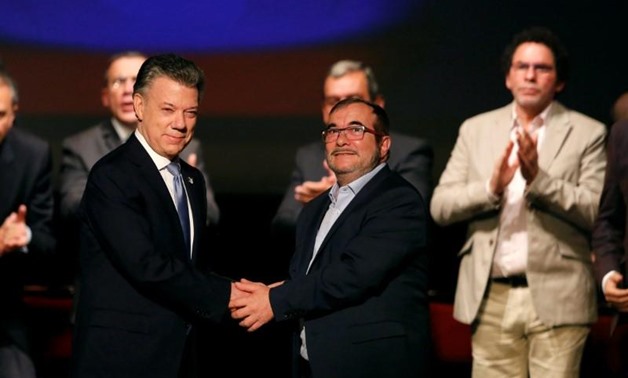
FILE PHOTO: Colombia's President Juan Manuel Santos and Marxist FARC rebel leader Rodrigo Londono, known as Timochenko, shake hands after signing a peace accord in Bogota, Colombia November 24, 2016.
Jaime Saldarriaga
BOGOTA - 27 August 2017: Colombia’s leftist FARC rebel group will debut its political party at a conference beginning on Sunday, a key step in its transition into a civilian organization after more than 50 years of war and its first chance to announce policy to skeptical voters.
The six-day meeting in Bogota of FARC members, who have handed in more than 8,000 weapons to the United Nations during their demobilization, is expected to conclude Friday with a platform that the party, still officially un-named, will campaign on in elections next year.
Under its 2016 peace deal with the government to end its part in a war that killed more than 220,000, the majority of Revolutionary Armed Forces of Colombia (FARC) fighters were granted amnesty and allowed to participate in politics. Whether Colombians, many of whom revile the rebels, will be inspired to back them remains to be seen.
The FARC’s often-old fashioned Marxist rhetoric strikes many as a throwback to their 1964 founding, but proposals for reforms to labyrinthine property laws may get traction with rural voters who struggle as subsistence farmers.
The peace accord, rejected by less than a 1 percent margin in a referendum before being modified and enacted, awards the FARC’s party 10 automatic seats in Congress through 2026, but the group may campaign for others.
“I think the FARC will try for a regional consolidation, using the presence and influence they have in certain provinces,” said Catalina Jimenez, politics professor at Externado University. “At a national level they need a large amount of votes they still don’t have.”
The FARC is open to coalitions, the group said this week.
Fractured by in-fighting, leftist parties have long struggled in conservative-leaning Colombia, despite some success in winning urban positions.
“We have to define our course of action, which will surely bring up the need to have coalitions,” FARC secretariat member Pastor Alape told reporters on Friday, adding the group wants a “big political convergence that redefines the limits of the left.”
Colombia’s “semi-feudal” state will need to be modernized, and the country must wake up to the scourge of corruption, Alape said.
Both legislative and presidential elections will take place in 2018. It is not yet clear for which positions the FARC will field candidates.
Widespread corruption scandals will likely be a top issue for the crowded field of 2018 presidential candidates, as will bettering the daily lives of Colombians, many of whom say improvements to security, public education and healthcare are desperately needed.
The FARC says the government of President Juan Manuel Santos, which gives a certain amount of regulated funding to each party, should help carry the costs of the conference, given the rebels have handed over their assets to be used as reparations for victims of the war.
But though the peace deal is the cornerstone of Santos' legacy, the government has raised doubts about the veracity of the rebels' $324 million asset list, creating a commission to check the FARC have included all profits they may have earned from extortion, ransoms and drug trafficking, and saying the group must play by the same rules as any other party.
The new party has no official name yet, though one rebel leader has said it could be called the Revolutionary Alternative Force of Colombia, preserving the FARC initials in Spanish.


Comments
Leave a Comment